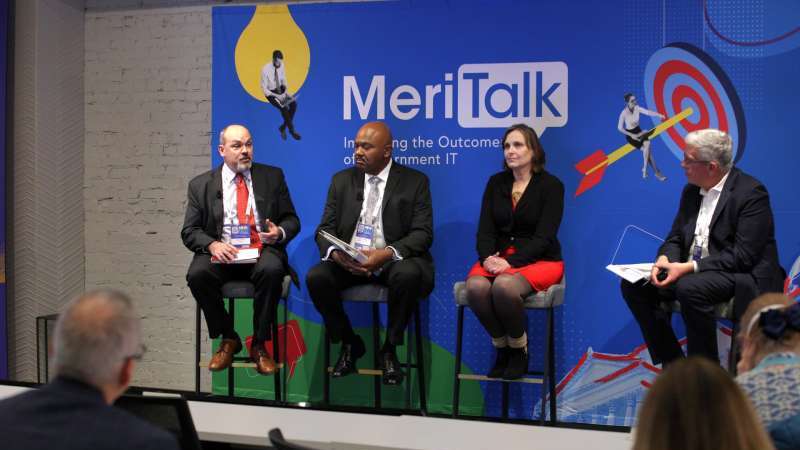
The private and public sectors are coming together to beat back bad actors, and that public-private partnership is something that cybersecurity experts on Dec. 8 said is “vital” to better protect data across the board.
At MeriTalk’s “New & Next: The Government Tech Renaissance” event in Washington, D.C., Alvin “Tony” Plater, acting chief information security officer (CISO) at the Department of the Navy, explained how his agency is working to strengthen this partnership.
“The public-private partnership is extremely important, and strategically at the Department of Navy. There’s been a recognition that the industry are the innovators, they’re creating our technological advantage. So, from a strategic perspective, it’s a priority,” Plater said.
“Right now, my direction by my CIO is: get in there and figure out what can we do to help industry better protect our data,” he said.
Building on that strategic mission, Plater said the Navy has “kicked off a major initiative” in which a team meets biweekly to discuss those partnerships with industry, and how his agency can better enable mid- to small-sized businesses.
“We’re looking at a 360-degree approach of that, supporting a public-private partnership, – we refer to it as secure the DIB [Defense Industrial Base] initiative – of how we can better help our DIB partners work with us to create and protect that technological advantage.”
Dawn Berry, Federal lead for security architecture and engineering at the Centers for Medicare & Medicaid Services (CMS), agreed that public-private partnership is “vital,” as CMS has hundreds of vendors.
“Our vendors are our innovators. They’re the ones who are pushing the envelope. We’re very dependent on them. We have to work closely with them,” Berry said.
Berry also noted that in order to have a strong private-public partnership, the Federal government needs to be “mindful of keeping a balance” and sending the right information out to all industry talent – small businesses included.
As for Andrew Stewart, national security and government senior strategist for cybersecurity at Cisco, private-public partnership is one of the highlights of his job.
“One of the most exciting things about my job at Cisco, coming from my 30 years in government, is actually continuing to serve and help government with that public-private partnership. I absolutely enjoy doing what I get to do with customers,” he said. “One of the most innovative things is helping them use what they have – leverage tools, technologies that are in their environment.”
For instance, Stewart said leveraging what agencies already have has been very helpful in zero trust journeys and implementing Identity, Credential, and Access Management (ICAM) solutions. Additionally, he said educating the workforce is another way to strengthen that partnership.
However, Plater warned that the nature of that public-private partnership means industry partners might be more targeted. Going forward, he said the Navy will be focusing on resiliency to better protect both partners and the country.
“We’re really shifting the focus as we go into 2023 of talking more about resiliency, and resiliency internally to the service, and talking to our partners about the point of: if you do business with us, then it increases your value to the adversary.”
